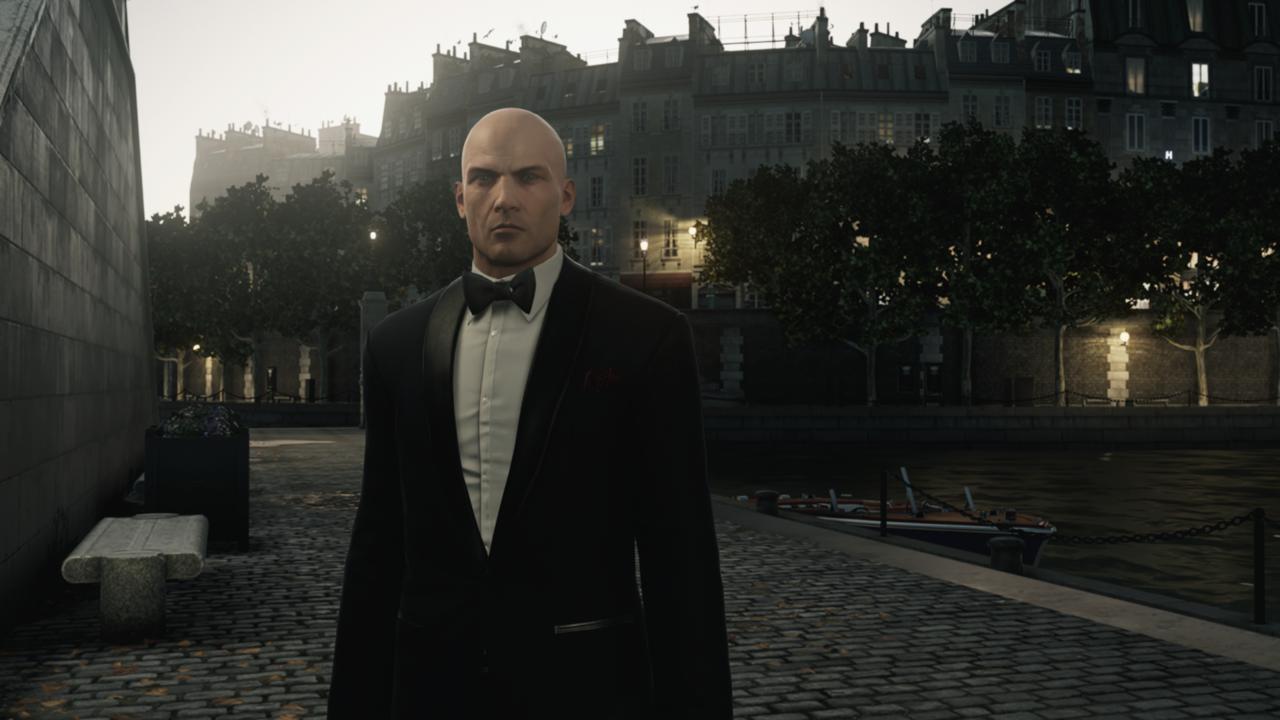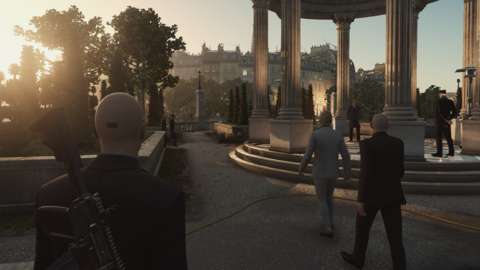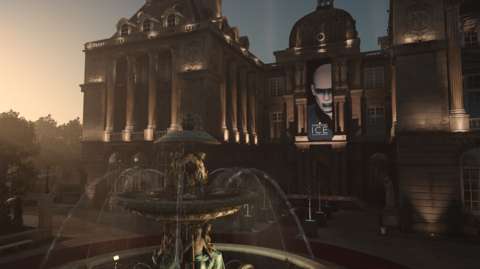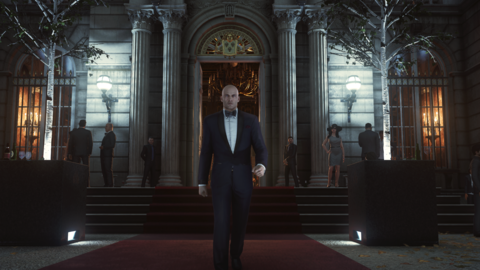IO Interactive's latest Hitman title--simply called Hitman--marks several firsts for the series. In addition to delving deep into Agent 47's mysterious past, the game will also launch episodically. The first three missions will release in March, with the remaining three coming in a staggered schedule later this year. The developer promises that all episodes will launch in 2016, effectively making Agent 47's mission a year-long adventure.
Recently we sat with with Hitman executive producer Hannes Seifert, who spoke at length about the team's decision split the main campaign. As Seifer explains, he and his team are done with the "ivory tower" game development mentality, in which they spend years cranking out a full game only to go silent for several more after its completion. In becoming a "live studio," as he calls it, IO hopes to respond more quickly to player feedback and do a better job supporting Hitman's online multiplayer feature, Contracts mode.
Along with the episodic structure and a more reactive world, players will be stepping into a new kind of Hitman game, one that feels more like a living, ever-evolving puzzle.

GameSpot: Why launch episodically? When did IO decide on this format?
Seifert: This idea came up when we talked the first time about how can we continue with Hitman from here. It sounded a bit crazy because nobody really had done something like that and there weren't even other games trying it--or perhaps there were some first games who [were trying to do] it, but not really. We thought about how can we bring Hitman really forward as a franchise. At the moment I use that word because it's a loved brand. It's 15 years old, and we tried other things with Hitman: Absolution, which became more linear, more story driven.
I felt that was not necessarily where [the series] was strongest because there are many narrative linear games out there, but there are very few where you can do what you can do in a Hitman game--a universe where you can actually change over time. We always have these visions, like, perhaps there are these cool Olympic games in this fantastic location and you could have this crowd of 60,000 people in an area. These kinds of things came up--how could we do that? How could we move that, without making another monolithic release, where you're sitting in your ivory tower for yet another six years and then you see if people like it? That's what we had between Blood Money and Absolution, and that also showed in the game. We wanted to move away from that.
Did you ever, when you were prototyping and workshopping, think this Hitman would work as a standalone game release? Or was that never in the cards?

There were moments where we had to make these decisions, whether we wanted to keep this as an option or not. In the beginning of the design, we wanted to keep it an option. At that time, it wasn't clear how the market would go. Everybody was talking about free-to-play games, which I personally am not a big fan of. Some of them are really cool, but I don't like them as a model. There were two core visions that I personally also wanted to fulfill for a long time. First was giving people the chance to have a game they can influence for a fixed price, which we will keep. That's really important for me. But the other thing was also to give people who can not dish out $60 an opportunity to enter the universe earlier but make all things possible.
It's not a free-to-play model, that's for sure. You need to buy the content you play and you can make your choice. Like in the game, you can make the choice how you want to do that. You can say,"Okay, I'll buy the game for $60.' You can wait until everything's out and buy it then for $60. Nobody is forcing anybody to buy it early. You can make the decision. Why make other people wait, that might want to join the journey from the beginning? The other way is, if you say, "I'm new to it" or "I don't want to spend the money, I don't have the money," you can also play it for $15.
In terms of the benefits of releasing episodically--other than what you said about allowing someone to still get into the universe even if they don't have $60--how do you think that episodic schedule will benefit you?
It's not us, it's [better for] the players, in my opinion. When I look at it myself and I play other games--and I don't want to name any competitive games now--but games that dipped into this more evolutionary direction, they just are better than the others. That's where I want to be, as well. I want to be as good as humanly possible with that game. The moment we come out, we see how people play it and we'll design accordingly. We can make much better informed design decisions while the game is running, than making decisions now for a game we shipped already. I also think episodic is a good narrative structure for a Hitman game because of the nature of the story. The setting is one thing, but the live component [Contracts] is another--it's what gives the chance that this game can become ultimately the best Hitman game we've ever done. I hope we start with that already, but from there, it will only become better.

What else about Absolution's launch informed this game? What did you learn?
Absolution was the first time we had serious server problems in infrastructure behind the game. We actually increased our spendings on that tremendously over the course of the game because we didn't expect Contracts to pick up like that. 40 percent of our players picked it up, and that is a huge number for an online component in a single-player game. There was a lot to be learned about how to structure Contracts, how to structure the database. We thought, "Wouldn't it be fun to get these people together in different ways?"
I think the most inspiring thing was seeing how many people really played online. Now, almost six years later, every console is online. Everything gets downloaded. We are now at a point in time where our vision can completely be executed without giving a disadvantage to anybody.

Let's say I get the second area but I want to go back and replay the first one. Can I?
You can replay anything at any time you want. There's an overarching story that connects them all, but as is the nature of an internet game, if you say, "I don't care for the story, I just want to have the cool hit," that's fine. You can do that as well. You can go back and forth anytime you want to. Of course, say you play the sixth [mission pack] first, then there will be a spoiler warning. You can do it if you want to.
When you first announced Hitman, you said IO would release the game and then support it with extra content for, I think the press release said, three or four years. But then you mentioned that you consider this game the first in a multi-storyline series.
Of course we will support this game, as long as people play it and I hope that will be quite a long time. What's correct is that, this is the foundation for the future games to come and with this model, you can actually shape [Hitman] in an interesting way because we have already our vision of what we want to do with the following games. Something we didn't in the past.
Also because our games were so long apart from each other, changes were so big. Normally, it was almost the next console generation [was when we] brought you the next Hitman game, and that's not necessarily where we want to be in the future. I don't think we are this kind of organization that churns out, every six months, a new game. That's not where we see that, but we want to really use this platform and make future games based on it. It doesn't mean you have to have this game if you want the future one. Of course not, but it will make way more sense in the context of everything, if you decide to do that.

You've described IO several times as a "live studio." Now that you're doing that, as opposed to shipping a game and then having a break, does this mean you are always on? Is it a very daunting task?
It is. It has advantages and it has challenges. One, moving ourselves from a classic ivory tower developer--that's what I like to call it--to a team who listens and gets things out early, also internally.
I had in my past times--more than enough--where you crunch for half a year and then, you need three months break to recover to the next game. Obviously you cannot do that if you want to be a live studio, because we cannot say bye-bye for three months to our fans once the game comes out. When it comes out, is actually when our real stress starts. That's how we see that. When we start, we will have something coming out every month. That means we are constantly in finishing and submission. That means we need to manage how we work as a studio pretty well.
We are not a big studio--120 people--and that is, compared to some of our competitors of course, a different ball game. From that perspective, we can also be very close to the game because everybody's really doing something important for it. That's the exciting part. The advantage is, we cannot put our people through major crunches, but obviously, it's more like running a TV show or a magazine or a news website, where you constantly have to deliver something. That's the other side, but I think that's better because then you can actually really change something all the time and you know what's working and what's not.
Hitman is 16 years old. Why do you think it has endured this long? What do you think gives this series that kind of longevity?
There are two elements to it, I think. There's the game and there's the character. Agent 47 is an iconic character. He's memorable. He's interesting but he's also a canvas. When he's best, he is a character you project your view of the role.
It's the simulation of an assassin, so it's not everybody's taste. But it's the taste of millions of people, and that makes it something really unique. I think we fulfill a fantasy, offering games with a play style that is pretty unique. In a Hitman game, there is something to do around every corner. Whether in the basement or on the yacht... There's no emptiness, but you also walk all the time... For us, it's this high-intensity creative sandbox and there are not many, if any, other games around that do that. I think the combination of these two things make it a lasting experience.

As a developer, how do you feel the series has changed in the years you've been working on it? What do you think about it?
The technology has evolved a lot, and you might have read some discussions about the look of 47. Like, "Ah, is he younger now? Is it a reboot? What is this?" I think that's completely legit. This is exactly what we want to hear. But also when we look at the first games, the barcode [on 47's head] was like four by four pixels deep and we had very low-res characters. Over the course of the games, more and more details came in. People that had been with us for 15, 16 years, they have a certain imagination of 47, because they had a lot of room to interpret who he is.
Now, we're modelling eyelashes and pores. That's a completely different ball game. Every fiber of his suit needs to be designed now. We've become more microscopic in what we see 47 is and the world around him is. We do things like that now. Why? Because you can stand and observe. It's about intensity. I think this ambition level has changed for us with every single game and is currently at its peak.
What is your favorite thing about this game? What is your favorite thing to work on?
I personally really like the combinations of the AI possibilities. That sounds a bit complex but for instance: You put a gun on the ground, a civilian sees it, runs away, fetches the guard, the guard sees it, picks it up and carries it somewhere, and that's something that's not scripted. It's just a procedural thing. If there's a body somewhere, someone will bag the body and carry it to the morgue and all these kinds of things.
That's the emerging gameplay. I think that's the short answer. The emerging gameplay is the most fun to work on. I like systemic games. I've worked on many of them in the past, and I think this is where we are currently really shining.

